Aerospace Engineer Salary: How Much Do Aerospace Engineers Get Paid?
25th Apr 2024
Without aerospace engineers, we would not have conquered the sky or touched the secrets of infinite space. Aerospace engineers have given us wings and paved the way to the stars. Let’s look at who they are, what skills they have, what an average aerospace engineer’s salary is and how it changes depending on experience. Perhaps our story will spark your future career!
What Is An Aerospace Engineer?
An aerospace engineer is a professional who designs, tests and manufactures aircraft and spacecraft. They are responsible for applying the principles of physics, mathematics and engineering to create and improve technologies related to aviation or outer space.
The term “aerospace engineering” was introduced in 1958, when active space exploration began. Flight technology has evolved so that a broader definition has become necessary.
Is being an Aerospace Engineer a Hard Job?
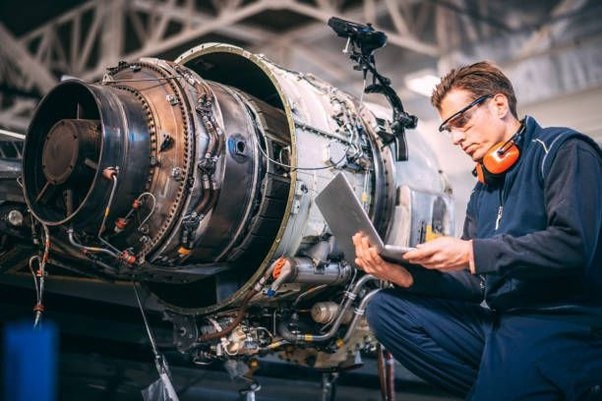
Aerospace engineering is considered one of the most challenging and demanding fields of work. It requires a lot of effort and concentration, intelligence and creativity. Engineers in this field develop, design, create and launch satellites and crewed aircraft, so they have a lot of responsibility not only for expensive equipment, but also for people’s lives. Every mistake can be very costly. These professionals must have a wide range of knowledge and skills in such areas as:
- Mathematics and physics: understanding of the complex mathematical concepts and physical laws that underlie flight and space dynamics.
- Engineering design: ability to design systems and components that meet specified standards and requirements.
- Materials Science: understanding the properties and applications of various materials used in the industry.
- Avionics, aerodynamics and propulsion: developing and optimising flight and engine control systems.
- System analysis and integration: integrating various subsystems into a single whole to provide spacecraft functionality.
- Programming and computer modelling: knowledge of software tools for modelling and simulation of flights and space missions.
- Project management: planning, coordinating and monitoring the implementation of projects on time and within budget.
- Communication: effective communication with colleagues, clients and other interested parties.
- Crisis management: ability to analyse complex situations and find optimal solutions.
Do Aerospace Engineers Earn Six Figure Salaries?
Some do. The salary of aerospace engineers usually depends on a combination of factors such as level of experience, specialisation, company, and country they are working in. For example, a novice specialist at ISRO can count on a minimal income and compensation package, but an aerospace engineering salary after 10 years in NASA, Boeing, or SpaceX is guaranteed to be in the six-digit range.
What Is The Pay-By-Experience Level For Aerospace Engineers?
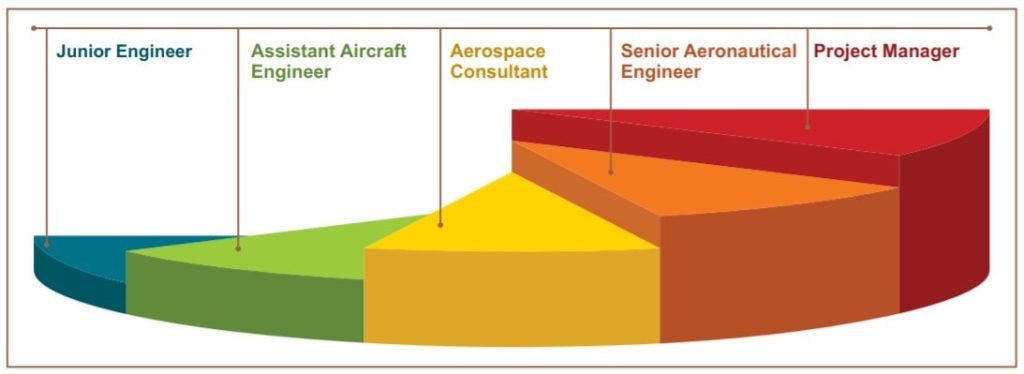
There are 5 gradations of experience level for space engineers:
- Entry level (less than 1 year of experience)
- Early level (1-4 years of experience)
- Mid-level (4-9 years of experience)
- Late career level (10-20 years experience)
- Experienced specialists (over 20 years of experience)
When moving to each next level of experience, a professional’s salary increases by approximately 10% at levels 2 and 3 and up to 25% at levels 4 and 5. Ultimately, over a 20-year career, you can more than double your compensation. However, you won’t be able to just sit and relax in a cosy office. Constant development is a must.
Which Country Pays the Most?
The USA is the world leader in the space industry, so the answer is obvious. According to the ZipRecruiter website, the US average salary for aerospace engineer is $108,000 in 2024. Depending on the state, the figure ranges from $75,000 to $126,000. The highest-paying states are Alaska, Massachusetts, and Washington. The demand for qualified specialists is the highest there, which is explained by the concentration of commercial and defence projects in these regions. The lowest-paying states are Florida and West Virginia. Entry-level aerospace engineer salaries in the country as a whole start at $42,000 per year, and leading specialists can count on $165,000.
The lowest and highest average salary in aerospace engineering in the US, state by state.
| State | Annual Salary | Monthly Pay | Weekly Pay | Hourly Wage |
| Alaska | $126,957 | $10,579 | $2,441 | $61.04 |
| Massachusetts | $125,154 | $10,429 | $2,406 | $60.17 |
| Washington | $120,426 | $10,035 | $2,315 | $57.90 |
| West Virginia | $78,732 | $6,561 | $1,514 | $37.85 |
| Florida | $75,570 | $6,297 | $1,453 | $36.33 |
How Much Can Aerospace Engineers Make in the EU?
The European Union holds the second place. Here, you will be paid from 50,000 euro to 70,000 euro per year, depending on experience and country of employment. The highest-paying countries are Germany and France, where companies invest heavily in aerospace research and development.
According to the uk.talent.com website, the average aerospace engineer salary in the UK is £42,500 per year. Entry-level positions start at £35,000 annually, while most experienced workers make up to £65,000.
Asian Countries
Asia, China and India are among the most promising areas for space engineers to work in. These countries are now experiencing rapid industrial growth, which has led to higher wages. So, in China, the median salary of such specialists is $45,000 per year, and in India, it is $11,000 (Rs. 900,000).
What Do NASA Aerospace Engineers Get Paid?
NASA is the world’s leading space agency, with activities ranging from defence projects in space to the colonisation of the Moon and Mars. Working at NASA is not only extremely valuable for getting unique experience and developing professional competencies but also offers a really high salary. According to glassdoor.com, a NASA space engineer’s salary in 2024 ranges from $94,000K-$148,000.
Unfortunately, employment in NASA is only available to American citizens; this restriction is related to national security. But this is no reason to despair. If you don’t have US citizenship, you can apply for a job at the US companies which allow certain exceptions for foreigners, or with local affiliates of international companies.
TOP Aerospace Companies to Work For In 2024
We have selected TOP 7 aerospace companies in 2024, where you can demonstrate your engineering skills and get a proper reward.
Median Aerospace Engineer Salaries In 2024
| Company | salary per year |
| SpaceX | $124K – $197K |
| Northrop Grumman | $94K – $143K |
| Boeing | $96K – $147K |
| Lockheed Martin | $97K – $151K |
| Blue Origin | $102K – $151K |
| Airbus | $95K – $150K |
| Rolls-Royce | $97K – $156K |
Career Prospects
BLS.gov predicts that the demand for qualified aerospace engineers in the labour market will increase by 6% over the next 8 years. This means approximately 3,900 new vacancies per year. The forecast is backed up by the following:
- increase in air traffic and, as a result, the need to modernise aircraft to reduce noise pollution and increase fuel efficiency.
- increased availability of space launches leads to an increased number of commercial satellites and their viability in orbit.
- growing demand for drones for defence, commercial, and environmental purposes.
- need to replace professionals who switch to another occupation or, more likely, retire.
To address these challenges, new specialists will be necessary, which will likely expand the employment opportunities for aerospace engineers.
High Ambitions Augur High Rewards
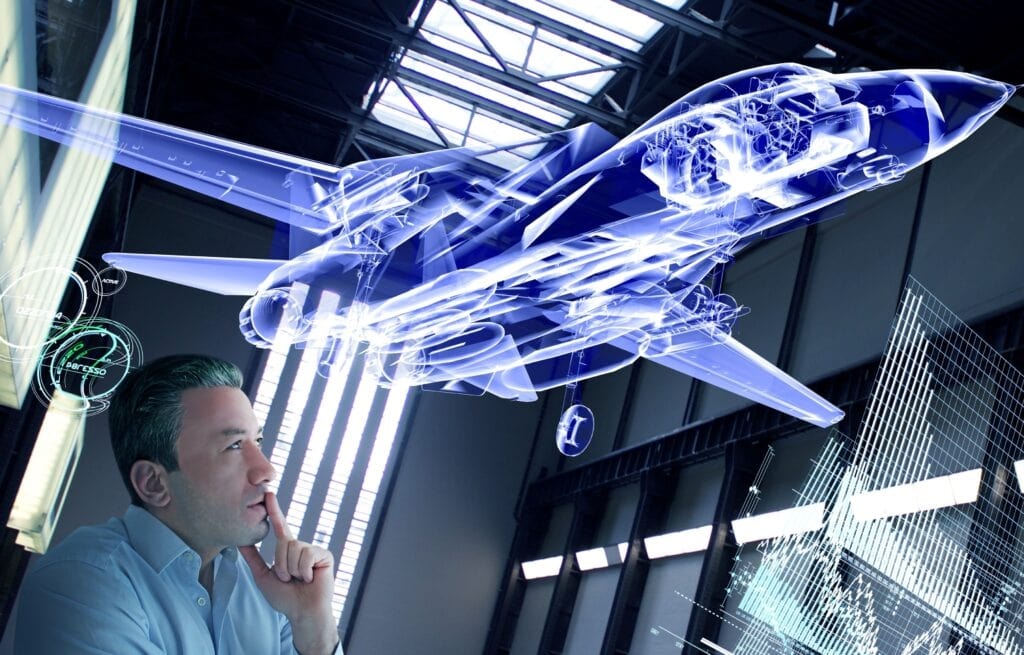
The professional growth potential in the industry is limitless, just like space itself. Engineering is the foundation of a prosperous and safe future for humanity, and if you feel its calling, it’s time to step on this thorny road and try to reach the stars. A high aerospace engineer salary will be a worthy reward for your efforts.
FAQ
To further entice your interest, we have prepared answers to the most frequently asked questions about aerospace engineer jobs.
What is the difference between aerospace and aeronautical engineering?
Aerospace engineering is a more general field that covers the design of both aircraft and spacecraft. Aeronautical engineering is specialised in the design of aircraft only within the Earth’s atmosphere, such as airplanes, helicopters, gliders, etc.
What is the difference between an aerospace technician and an engineer?
Engineers typically create designs and plans for new technologies or improvements to old ones based on proven scientific evidence. They usually have a bachelor’s or master’s degree in a specific field. Technicians perform most of the design and construction tasks associated with engineering projects. They may have an associate’s degree in a related field.
What does it take to be an aerospace engineer?
You need to study a minimum of four years for a bachelor’s degree in engineering. You also need to have high scores in mathematics, physics, computer science, advanced communication and analytical skills, creative thinking, and the ability to adapt to new conditions and solve problems.
What are the working conditions of aerospace engineers?
Professionals can work either independently or in a team. Depending on their specialization and responsibilities, they spend time in the office, laboratories, production floors, or test sites. Their standard work schedule is five days a week, eight hours a day, but these hours may include overtime and travel.
What is the average salary of an aerospace engineering specialist?
Depending on the specialisation, qualifications, experience and place of work, the average basic annual salary can range from 40 to 165 thousand dollars.
What benefits and bonuses besides basic salary can aerospace engineers receive?
Some incentives in an engineer’s benefits package may include:
- Dental insurance
- Employee stock ownership plan
- Health insurance
- Paid housing
- Paid time off
- Parental leave
- Referral programs
- Relocation assistance
- Tuition reimbursement
- Vision insurance
What are the job prospects for aerospace engineers?
The prospects depend on various factors, including economic conditions, government investment in space programs, and commercial initiatives. With growing interest in research and the development of the private space sector, the demand for specialists in this field, according to analysts, will grow steadily over the next 8–10 years.
Are aerospace engineers smarter than ordinary people?
No. Scientists from the University of Bristol, UCL and King’s College London compared the intelligence of 329 aerospace engineers with 18,257 average people. The purpose of the study was to show that the profession of such engineer is not difficult, and so, to encourage young people to pursue it.
Study participants completed an online test that assessed various aspects of human thinking: in particular — planning and reasoning, working memory, attention span, and the ability to process emotions. The analysis also considered gender, hand dominance, and life experience.
The study found that engineers did not stand out from other participants on most scores. However, they demonstrated better cognitive manipulations.
Who are the most famous aerospace engineers in history?
- Robert Goddard — American physicist and engineer who launched the world’s first liquid fuel rocket.
- Wernher von Braun — the inventor of the German V2 ballistic rocket, which became the prototype of space rockets, as well as the creator of the largest launch vehicle in the world, the Saturn V, which took Americans to the Moon.
- Sergei Korolev — the first chief designer of the Soviet aerospace industry. Under his leadership, the Soviets launched the first artificial Earth satellite and the first man, Yuri Gagarin, into orbit.
- Igor Sikorsky — Ukrainian aircraft designer, inventor of multi-engine biplanes and the world’s first mass-produced helicopter.
- Neil Armstrong — American engineer and astronaut, the first man to set foot on the moon.
References and Additional Information:
- What Is the Average Aerospace Engineer Salary by State
https://www.ziprecruiter.com/Salaries/What-Is-the-Average-Aerospace-Engineer-Salary-by-State - Aerospace Engineers summary
https://www.bls.gov/ooh/architecture-and-engineering/aerospace-engineers.htm - Are aerospace engineers and neurosurgeons really smarter than regular people?
https://www.bmj.com/company/newsroom/are-rocket-scientists-and-brain-surgeons-really-smarter-than-everyone-else/ - How to Become an Aerospace Engineer
https://www.mtu.edu/mechanical/aerospace-engineering/ - How much does aerospace engineers make
https://www.glassdoor.com/Salaries/aerospace-engineer-salary-SRCH_KO0,18.htm - The 10 greatest aerospace engineers of all time
https://www.mnbprecision.com/greatest-aerospace-engineers/
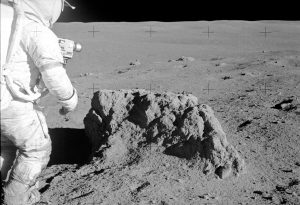
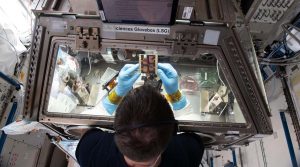
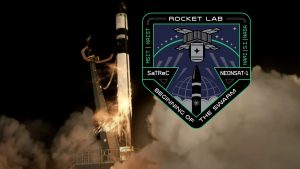



Thank you for your comment! It will be visible on the site after moderation.